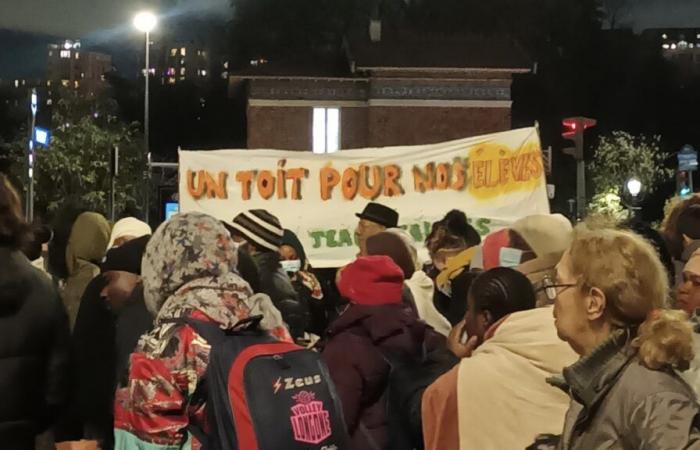
The freezing temperatures did not stop the hundred demonstrators present in front of the town hall of the 19th arrondissement on Wednesday November 20. Among them, activists from the collective, several political representatives and above all, men, women, and many young children, deprived of a fixed and decent home.
Since November 2023 and the region's decision to requisition five disused Parisian high schools in order to transform them into emergency accommodation centers, only three of these establishments have been invested. A wish from elected Communists and Citizens nevertheless validated, during the Paris Council of May 2024, the official and planned requisition of the Brassens high school. But since then, the 19th century town hall has not taken any action in this direction.
François Dagnaud, PS mayor of the 19th, did not hide his annoyance with this proposal during the district council meeting on November 5. The elected official invoked the need for “solidarity within solidarity”so that the burden of social missions in Paris does not rest solely on the shoulders of the districts of north-eastern Paris. The elected official is also offended that Fatoumata Koné, president of the Parisian Ecologists group, and others attribute these remarks to him: “The 19th cannot accommodate all the misery in the world.”
These remarks are not audible in the transcription of the session published on the town hall website, but several elected officials claim to have heard them. Despite the mayor's rebuttals, the episode ignited the powder. Contacted by the Bondy blog, the town hall did not respond.
The 19th too united?
Lucie, a member of the parents' association, FCPE Jaurès, is moved by the town hall's refusal to open the Lycée Georges Brassens. “It’s an absurd response to a completely catastrophic situation,” she reacts. For Manon Luquet, representative of the Jamais Sans Toit IDF collective and substitute for Aymeric Caron, LFI deputy for the 18th constituency, the argument put forward by the mayor of the 19th is not valid.
“The district which has the most people on the streets is still the 18th. On the other hand, the second is the 15ᵉ, which is really not a district in the north-east of Paris”she maintains. The association assisted the 18th town hall in opening the Valadon high school as an emergency accommodation center (CHU) during the past year. The latter does not hide her anger at seeing a left-wing mayor make these comments publicly. “I found it all the more odious because during this district council meeting, a family of homeless people was present. »
Faced with the mayor's fear of seeing the 19th become a land of universal welcome, citizens and activists on the contrary show significant solidarity towards the families in need, whether they are from the 19th or not. This is the case with Alexia. “There is no solidarity quota”she protests. This 19th century resident herself wrote letters to the mayor hoping to be heard. “It’s more reassuring to work with a left-wing town hall, we tell ourselves that we will have greater leverage”she hopes.
Emergency accommodation crisis amid political dispute
Communist elected officials and environmentalist elected officials are also accused of supporting a decision taken by the LR president of the Île-de-France region. An inconsistency, for the socialist town hall. Camille Naget, advisor to the Communists and Citizens group behind the wish, laughs. “If Valérie Pécresse was known for her commitment to people on the streets, it would be known. » Indeed, this decision by the region is not entirely disinterested.
In November 2023, the closure of seven Parisian vocational and technological high schools shocked left-wing elected officials. The latter pointed out the lack of solutions provided to the students of these high schools, mainly from working classes and who had to readjust to new, distant establishments during their studies. “This Brassens high school, we fought against its closure, and today, we are fighting for its reopening in a new form”summarizes Camille Naget. Faced with the opposition's outcry and a week-long negotiation, Valérie Pécresse conceded the opening of five of these high schools as university hospitals.
“I am leading this battle against the Barnier government which is that of Madame Pécresse, but it turns out that there is an emergency, and if Madame Pécresse agrees with our struggle, I am for taking her at her word »assumes Danièle Obono, deputy of the 17ᵉ district of Paris. “France has a commitment to the Convention on the Rights of the Child. It’s a humanist question, not a political one.”supports the MP.
A limited but important proposal
The fight to open a new university hospital appears urgent and necessary as the cold sets in. But what concrete response will it provide to the approximately 400 families on the streets in Paris? Awa, 8 months pregnant and mother of Moussa, 18 months, says: “Often we are put on the street for a week and in a hotel for a week. It’s very difficult”. Despite the minimal comfort provided by the university hospitals, it is an additional response that is worth fighting for for Awa who faces the snow and the dangers of the street. In France, the housing crisis, and by extension, the emergency accommodation crisis, is leaving hundreds of children on the street, like little Moussa.
Jeanne Séguineau





